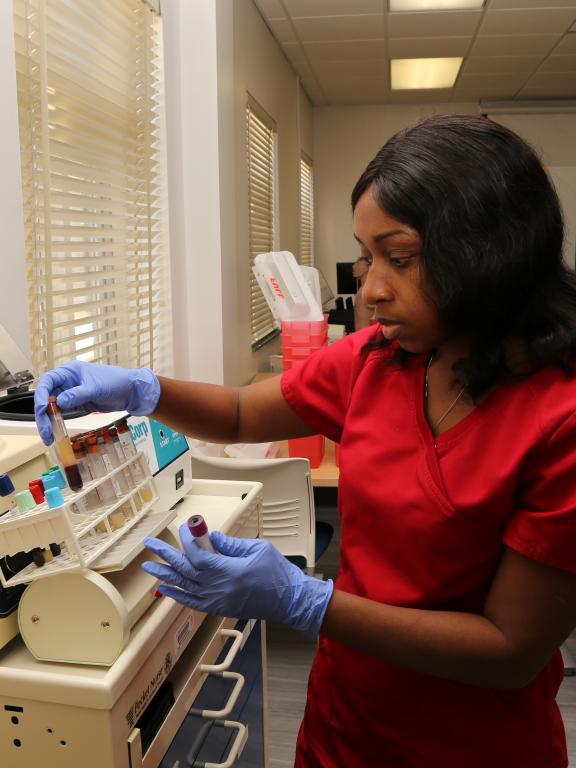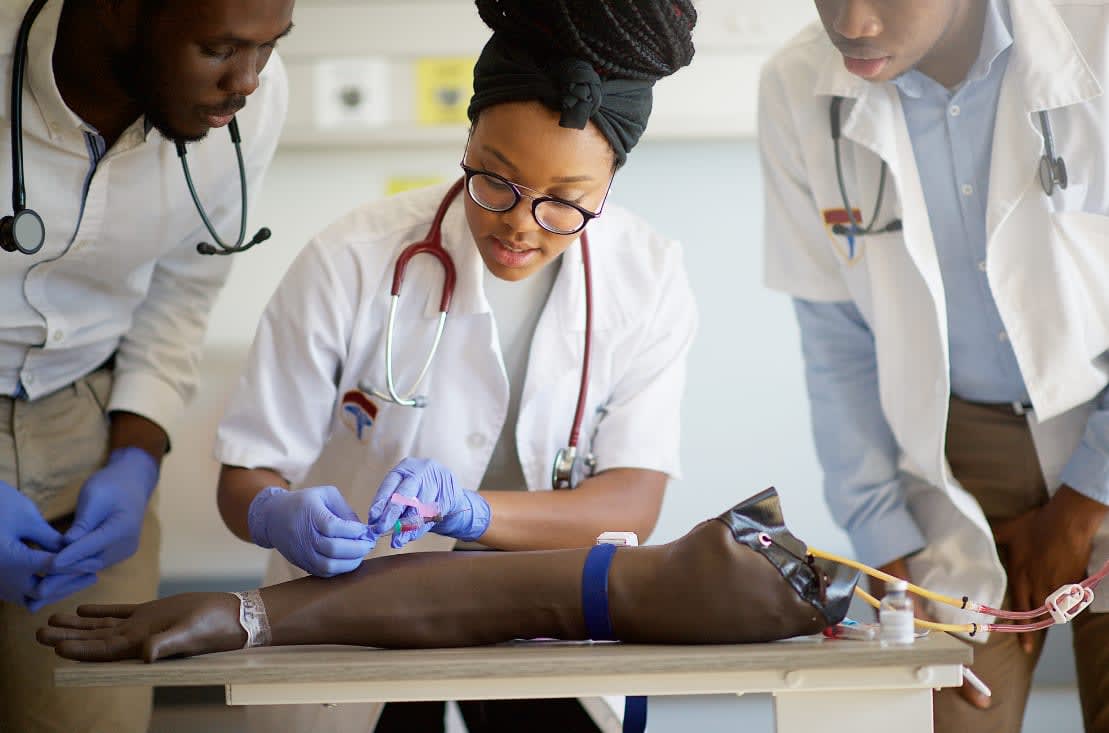The Course to Certification: Comprehending the Phlebotomy Educating Program Journey and Its Significance
As you take into consideration the path to accreditation in phlebotomy, it is essential to recognize the role you'll play in healthcare. Your training will cover necessary abilities, from blood collection techniques to patient interaction. Each component of the program prepares you for the difficulties ahead. However what specifically does the trip require, and why is certification so essential for your future profession? Allow's discover these inquiries better.

The Duty of Phlebotomists in Health Care
Phlebotomists play a vital role in the medical care system, functioning as the essential link in between clients and important analysis screening. You'll carry out blood attracts, making sure samples are accumulated precisely and securely. Your know-how assists in detecting medical problems, keeping an eye on health, and leading treatment choices.
In your everyday communications, you'll need to develop count on with people, making them feel comfy during what may be a stressful experience. You are accountable for labeling and taking care of samples very carefully to avoid contamination or mistakes, which could impact examination results.
Yet, you'll often function along with doctors and registered nurses, communicating vital details about individuals' problems. Your role is essential in keeping the workflow in health care setups, making certain timely and accurate results. By grasping your abilities, you add meaningfully to person care, making you an essential component of the clinical team. Embracing this obligation is vital to your success as a phlebotomist.
Introduction of Phlebotomy Training Programs
When exploring phlebotomy training programs, you'll discover various types made to fit different timetables and discovering styles. Each program assists you develop crucial skills like blood collection and person interaction. Comprehending these options is essential to choosing the right path for your profession.
Kinds Of Training Programs
Numerous kinds of training programs are offered for those looking to come to be competent in phlebotomy. You can pick from certificate programs, which commonly last a few months and concentrate on important skills. There are likewise diploma programs that give a more thorough education and learning, usually lasting approximately a year. If you're seeking a much deeper understanding, an associate level in a relevant area may be the right fit. On-line courses offer flexibility for those balancing job or family members commitments, allowing you to research at your own rate. Furthermore, some healthcare facilities and clinics supply on-the-job training programs, giving practical experience while you discover. Whatever path you choose, each program intends to equip you with the necessary abilities for a successful phlebotomy job.

Secret Skills Developed
Grasping phlebotomy requires a collection of crucial abilities that are created through thorough training programs. Additionally, communication skills are essential; you'll require to engage with individuals, discuss treatments, and put them at convenience. Each of these abilities is essential for your success as a qualified phlebotomist, making you a useful asset in any kind of health care setting.
Trick Parts of a Phlebotomy Course
In a phlebotomy program, you'll focus on essential subjects that prepared for your future job. You'll involve in hands-on training that allows you to use what you've discovered in real-world settings. Both the core educational program and practical experience are essential for your success as a phlebotomist.
Core Curriculum Review
While pursuing a phlebotomy training program, you'll encounter a curriculum made to furnish you with basic skills and understanding. Phlebotomy school. This curriculum usually consists of anatomy and physiology, concentrating on the blood circulation system and comprehending blood parts. You'll additionally learn more about different sorts of blood collection approaches, including venipuncture and capillary leak methods
Additionally, infection control and safety protocols are vital elements, ensuring you know how to keep a sterilized setting. You'll study patient interaction, emphasizing interaction and empathy, which are critical for easing individual anxiousness.
Hands-On Training Experience
Getting hands-on experience is an essential part of your phlebotomy training course. This practical training allows you to use what you have actually discovered in a real-world setting, enhancing your abilities and self-confidence. You'll practice venipuncture strategies, find out exactly how to deal with different kinds of samplings, and get acquainted with the devices utilized in the field. Under the advice of knowledgeable trainers, you'll refine your abilities, guaranteeing you're prepared for any kind of circumstance you might encounter.
In addition, you'll get the opportunity to engage with patients, which is important for developing your communication skills. This mix of technological proficiency and social skills is essential for your success as a licensed phlebotomist. Eventually, hands-on training is where theory fulfills practice, strengthening your knowledge and readiness for qualification.
Accreditation and Licensing Demands
Prior to you can start your occupation in phlebotomy, it is vital to comprehend the qualification and licensing requirements that differ by state. The majority of states need phlebotomists to hold a qualification from a recognized organization, such as the National Phlebotomy Organization or the American Culture for Medical Pathology. These accreditations typically include passing an examination that examines your knowledge and skills in the area.
Along with certification, some states have particular licensing demands. You may need to finish a particular variety of hours in medical practice, submit evidence of training, or undertake a background check. It is essential to research your state's regulations to make certain you satisfy all required criteria.
Remaining educated regarding these requirements not just aids you protect a position yet additionally improves your reliability as a professional. By meeting these Phlebotomy Courses Near Me demands, you'll be well on your way to an effective occupation in phlebotomy.
Hands-On Training and Practical Experience
Hands-on training and useful experience are essential elements of your phlebotomy education, as they allow you to apply theoretical expertise in real-world scenarios. Throughout your training, you'll involve in monitored venipuncture, discover proper techniques, and become aware of numerous blood collection tools. This straight involvement is crucial for building your confidence and sharpening your abilities.
You'll work closely with experienced specialists that can direct you with the nuances of person communication and sample handling. Each practice session not just strengthens your understanding but also prepares you for the busy atmosphere of health care setups.
In addition, numerous programs incorporate professional turnings, allowing you to experience varied setups, from healthcare facilities to outpatient clinics. This direct exposure assists you adjust to different challenges and person requirements, guaranteeing you're well-prepared for your future function. Embrace these possibilities, as they're vital to becoming an experienced and caring phlebotomist.
Obstacles Dealt With Throughout Training
While getting hands-on experience is important, it is essential to acknowledge the obstacles that can occur throughout your phlebotomy training. You might come across anxiety when doing procedures on genuine people, especially if you're brand-new to the environment. The pressure to obtain everything right can be overwhelming. In addition, mastering the skills needed for blood draws takes method; you might fight with method originally.
Time administration can additionally be a difficulty, as balancing theory, useful sessions, and personal dedications can really feel daunting. You might encounter varying learning paces among your peers, causing sensations of insecurity if you assume you're falling back. Adapting to the different personalities of instructors can be challenging, as each may have an unique teaching style.
Recognizing these obstacles early on can prepare you for success and help you create strength throughout your training trip.
Job Opportunities After Qualification

As you get experience, you may even take into consideration concentrating on locations like pediatric or senior citizen phlebotomy, accommodating particular client demands. Some phlebotomists pick to advance their professions by ending up being laboratory specialists or pursuing further education and learning in health care areas.
Additionally, your accreditation can cause duties in training or overseeing brand-new phlebotomists, permitting you to share your understanding. With the health care market consistently growing, your abilities will certainly constantly be in need, leading the way for a steady and meeting occupation. Embrace the chances awaiting you!
Often Asked Concerns
What Is the Regular Period of a Phlebotomy Educating Program?
Phlebotomy training programs generally last around four to eight weeks. You'll take part in hands-on practice, classroom instruction, and online understanding. Completing this training prepares you for certification and a gratifying job in health care.
Are Online Phlebotomy Courses Available?
Yes, on-line phlebotomy courses are available. They supply flexibility and comfort, permitting you to examine at your very own pace. Just verify the program is approved to fulfill accreditation demands and acquire useful abilities for your occupation.
Just How Much Does Phlebotomy Training Usually Expense?
Phlebotomy training generally sets you back in between $700 and $2,500, depending on the program and location. You ought to take into consideration elements like training course length, consisted of materials, and hands-on experience when picking the ideal training for you.
What Prevail Requirements for Phlebotomy Training?
Typical requirements for phlebotomy training frequently include a high institution diploma or GED, booster shots, and a history check. Some programs might additionally call for basic health care understanding or accreditations, ensuring you're prepared for hands-on training.
Can I Function While Finishing My Phlebotomy Training?
Yes, you can work while finishing your phlebotomy training. Several students balance work with their studies, yet ensure to manage your time properly to assure you meet both job and training commitments efficiently.